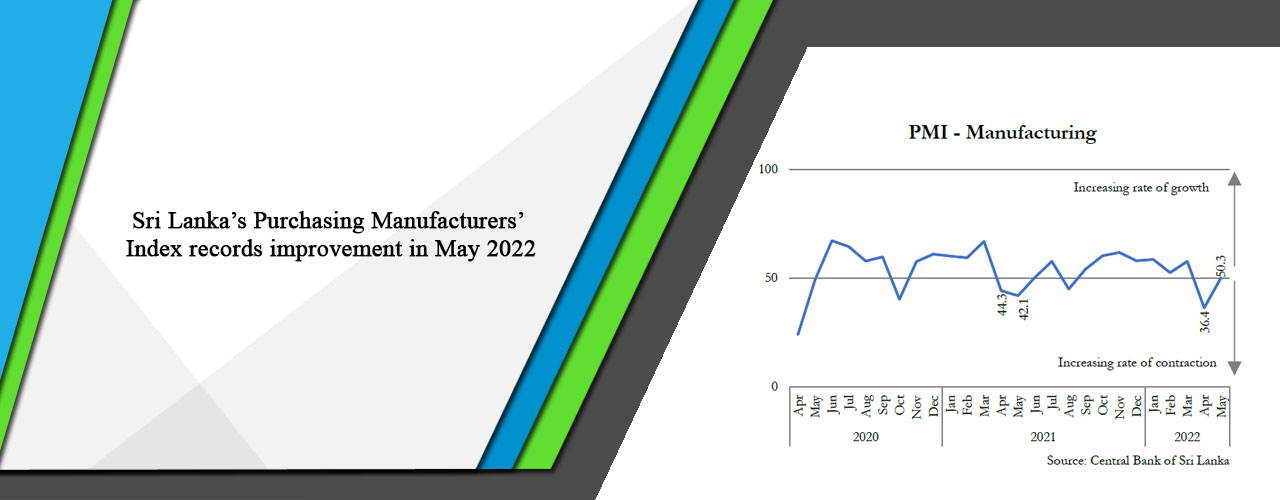Sri Lanka’s Purchasing Manufacturers’ Index records improvement in May 2022
The Morning: The Purchasing Manufacturers’ Index (PMI) recorded an index value of 50.3 in May 2022, with an increase of 13.9 index points from the seasonally low value in the month of April, a press release issued by the Statistics Department showed.
The slight edging up of the PMI was mainly due to the recovery of employment and the lengthening of suppliers’ delivery time. Even though the lengthening of suppliers’ delivery time generally reflects an expansion in the manufacturing activities, in this instance it was primarily due to supply-side impediments arising from clearance delays of imported goods and fuel shortage. Moreover, employment edged up during the month, particularly in the manufacture of textiles and apparel, partly due to cross-industry employee movements.
Meanwhile, new orders, production, and stock of purchases remained contracted on a month-on-a-month basis, yet at a slower pace, indicating subdued performance in manufacturing activities in May 2022. The subdued performance in production and new orders were particularly witnessed in the manufacture of food and beverages. The contraction in new orders was partly due to the ending of the festive month.
Further, some respondents mentioned that deterioration of purchasing power due to high inflation together with cautious consumer spending amidst prolonged uncertainty over economic woes resulted in the decline in demand, particularly for the goods of non-essential nature.
Moreover, the production process of the manufacturing sector has been severely hit by numerous supply-side constraints, including a shortage of materials and the ongoing power outages. Further, the stock of purchases declined mainly due to the unavailability of required quantities in the domestic market and difficulties in opening letters of credit for importing materials, forcing many producers to significantly slow down their production.
For the next three months, the overall expectations for manufacturing activities continued to deteriorate compared to the previous month due to the prevailing uncertain economic environment in the country.
Services PMI dropped marginally to an index value of 42.4 in May 2022, indicating a contraction in services activities for the second consecutive month. This was due to the declines in the new businesses, business activities, employment, and expectations for activity sub-indices. New businesses declined further in May 2022 compared to April 2022, particularly with the decreases observed in accommodation, food and beverage, wholesale and retail trade, real estate, and education sub-sectors.
Decline observed in business activities in May was mainly due to supply-side constraints including prolonged power outages and energy shortage. In addition, subdued demand attributable to rising prices and uncertainties in the country also contributed to the decline in business activities.
Meanwhile, the civil unrest that occurred at the beginning of the month also had a negative effect on the business activities. Accordingly, wholesale and retail trade, other personal activities and transportation sub-sectors recorded major declines during the month. In addition, business activities of the accommodation, food and beverage sub-sector were also affected by the continued drop in tourist arrivals.
Employment continued to decline in May due to terminations in line with the decline in business activities, retirements, and resignations. Meanwhile, power outages, supply shortages and transportation difficulties led backlogs of work to increase further during the month.
Expectations for business activities for the next three months deteriorated further in May due to supply-side constraints, inflationary pressure, and economic and political uncertainties in the country. Further, some respondents were also concerned over increase in interest rates and taxes, whereas some were optimistic on the progress made on International Monetary Fund (IMF) discussions and exchange rate stabilization.
OSL take:
The growth in the PMI is indicative of the overall expansion in Sri Lanka’s manufacturing industry. The country’s manufacturing and exports industries have shown continuous growth rates even amidst the global pandemic. Sri Lanka’s overall economic activities and the many trade agreements as well as concessions enjoyed by the country have helped boost the manufacturing and exports industries. The rupee depreciation against the dollar has also helped these two sectors with the government of Sri Lanka also introducing incentives to further expand operations of these sector. Given the positive movement in the manufacturing and exports industries, foreign businesses/investors could confidently explore the growing opportunities in these areas while also looking at forming partnerships or joint ventures with local businesses.
| Article Code : | VBS/AT/24062022/Z_1 |

